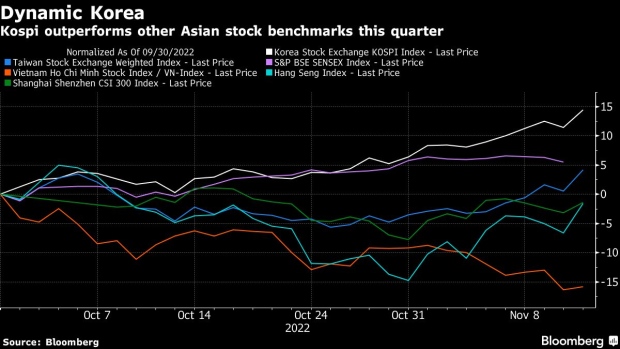Nov 13, 2022
Global Funds Gorge on Korea Chip Stocks, Putting Kospi Atop Asia
, Bloomberg News

(Bloomberg) -- Foreign investors have poured about $4.6 billion into stocks on South Korea’s Kospi since the end of September, making it the best-performing Asian equity benchmark so far in the last quarter of the year.
An 18% surge in Samsung Electronics Co. has been the biggest driver in Kospi’s 15% jump so far this quarter, with the chip sector getting a further lift Friday as softer-than-expected US inflation data eased rate-hike concerns. Persistent tensions between Washington and Beijing have made Korean tech shares an attractive alternative to Greater China rivals, while the won’s rebound against the dollar has also helped.
Global technology shares have staged a recovery of late, with the Nasdaq 100 on track for its first quarterly gain in 2022. Lingering doubts about Federal Reserve policy and a possible global recession, however, cast some caution on the rally’s durability.
“I expect the rebound to continue through November,” said Shin Jin-Ho, co-chief executive at Midas International Asset Management, which manages $10 billion in assets. “While liquidity risks related to the real-estate sector’s project financing still linger and could halt the rebound, the Korean tech sector overall could see continued inflows from foreign funds.”
READ: Credit Crunch in Korea Flashes Warning on Limits of Intervention
The Kospi had dropped in each of the previous five quarters, as the benchmark fell 35% from its 2021 record high amid a plunge in the won that prompted authorities to intervene in the currency market. The nation also tightened short-selling rules last month. Things turned a corner in October as foreign funds rushed back into stocks on perceived benefits from the US ban on some tech exports to China.
With China and Taiwan part of emerging markets benchmark index, “if investors are concerned about the geopolitical issues then there are only a few other large liquid markets left,” said Sanjeev Rana, an analyst at CLSA Securities Korea. “That’s why we have seen big fund flows into the Korean market.”
A regional lift from expectations for China’s gradual post-pandemic reopening has also acted as a catalyst. At the same time, US President Joe Biden’s climate bill bolstered the appeal of the Korean battery supply chain, helping drive LG Energy Solution Ltd. up 46% since the end of September.
READ: This China-Dependent Play Showing More Bullishness Than China
Even with the recent surge, the Kospi is still down 17% this year after a selloff driven by concerns over interest rates, slowing growth and tech valuations. Export-dependent South Korea may require a clear signal that the global economy is on track for recovery before a full-fledged rally, according to Charu Chanana, a senior strategist at Saxo Capital Markets.
“I would be wary of too much optimism as equities still need to price in a recession risk,” she said. “Not to mention, the latest crypto crash, which can spell liquidity concerns for Asian markets.”
--With assistance from Abhishek Vishnoi and Ishika Mookerjee.
©2022 Bloomberg L.P.





